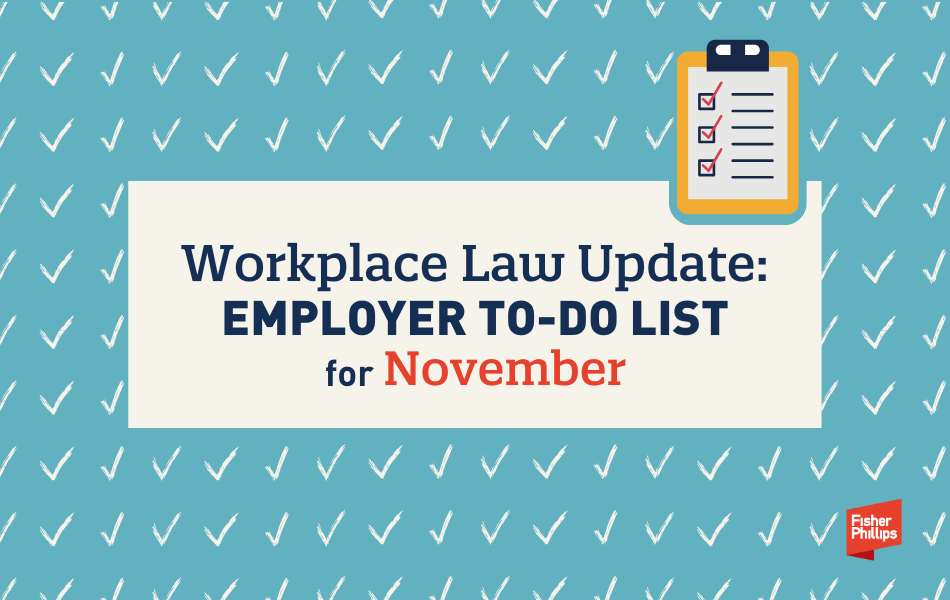Workplace Law Update: 10 Essential Items on Your November To-Do List
Insights
11.01.24
It’s hard to keep up with all the recent changes to labor and employment law, especially since the law always seems to evolve at a rapid pace. In order to ensure you stay on top of the latest changes and have an action plan for compliance, here is a quick review of some critical developments we tracked in October and a checklist of the essential items you should consider addressing in November and beyond.
|
_____ |
Plan for workplace impacts of election results. In 2025, we’ll have a new president and likely see changes in Congress and state and local governments. Additionally, voters will weigh in on a number of state ballot issues that affect the workplace, like paid leave, recreational cannabis, and minimum wage laws. Visit our Election Season Resource Center to review all our thought leadership and practical resources – and check back often. We’ll continue to provide post-election resources as you prepare for the new year. |
|
_____ |
Consider performing a year-end pay equity audit. Many employers are now turning to the year-end performance review process and making decisions about bonuses, raises, and incentives for employees — which makes this an ideal time to audit your pay practices and fix any potential disparities. Here are four key steps you should consider taking this comp season to ensure pay equity, level the playing field, and avoid significant penalties. |
|
_____ |
Track court battles over the FTC’s non-compete ban. The Federal Trade Commission recently appealed two federal trial court decisions – one in Texas and one in Florida – that prevented the agency from enforcing its near-total ban on non-compete agreements. Click here to learn more about these appeals and what you should do while they play out. |
|
_____ |
Keep up with new data privacy developments. Businesses that use website tracking software to monitor activity for marketing purposes must comply with a growing list of state laws. But do state wiretapping laws apply to third-party cookies, pixels, and other tracking technology on your websites? Here’s what businesses across the country need to know about an October 24 ruling in Massachusetts and five steps you can take to comply with evolving data privacy rules. |
|
_____ |
Go over your open enrollment checklist. As you announce your benefit offerings for the upcoming plan year and tirelessly work to inform employees of their options, answer their questions, and handle the administration on the back end, you must be aware of key laws impacting annual open enrollment in the workplace. Click here for five legal considerations and key takeaways to help you stay compliant. |
|
_____ |
Review workplace contracts for compliance. The Labor Department’s top lawyer announced on October 15 that the agency would target seven specific employment-related contract provisions that she believes could discourage workers from exercising their rights under federal workplace laws. Learn more here about the contract provisions that are under the DOL’s microscope and what you should do about this development. |
|
_____ |
Work with legal counsel to understand new risks of stay-or-pay provisions. The National Labor Relations Board’s General Counsel recently said that many “stay-or-pay” provisions – agreements where workers are asked to repay their employer if they separate from employment – violate federal law, and also reminded employers that she believes many non-compete agreements also run afoul of existing law. If that wasn’t enough, NLRB General Counsel Jennifer Abruzzo’s October 7 memorandum also said that employers have just 60 days to cure such unlawful agreements and could face potentially drastic monetary remedies if they don’t. Click here for seven steps you should consider taking given this new attack on common workplace practices. |
|
_____ |
Keep up with the latest AI trends. Artificial Intelligence (AI) is reshaping how your business operates – but adopting AI technology comes with new responsibilities. The only way to ensure that the AI you use aligns with your business goals, complies with regulations, and operates ethically is through “AI governance.” Here’s your 10-step guide for getting started, covering the basics and helping you avoid risks from day one. |
|
_____ |
Simplify your cancellation process. The federal government just fundamentally changed how businesses need to handle recurring subscriptions by unveiling its new “Click-to-Cancel” rule and making it mandatory to simplify cancellation processes. Designed to eliminate so-called “tricks and traps” in subscription cancellation, this new rule released by the FTC on October 16 addresses consumer complaints about confusing and restrictive procedures. Here’s a breakdown of the rule and a five-step plan to keep your business in the clear. |
|
_____ |
Update your social media policies. The latest TikTok trends encouraging people to post from work have garnered millions of views as employees post videos from their jobs in retail, office, healthcare, and a host of other settings. As social media use and trends evolve, you may want to regularly review and adjust your guidelines to strike the right balance while also ensuring your policies don’t run afoul of employment and labor laws. Here are four tips for updating your social media policies to reflect this modern era and stay on top of the latest developments. |
We will continue to monitor developments related to all aspects of workplace law. Make sure you are subscribed to Fisher Phillips’ Insight System to get the most up-to-date information. If you have questions, contact your Fisher Phillips attorney.
Related People
- Lisa Nagele-Piazza
- Lead Content Counsel
Service Focus
- AI, Data, and Analytics
- Consumer Privacy Team
- Counseling and Advice
- Employee Benefits and Tax
- Employee Defection and Trade Secrets
- Employee Leaves and Accommodations
- Government Relations
- Labor Relations
- Litigation and Trials
- Pay Equity and Transparency
- Privacy and Cyber
- Wage and Hour
- Workplace Safety and Catastrophe Management

